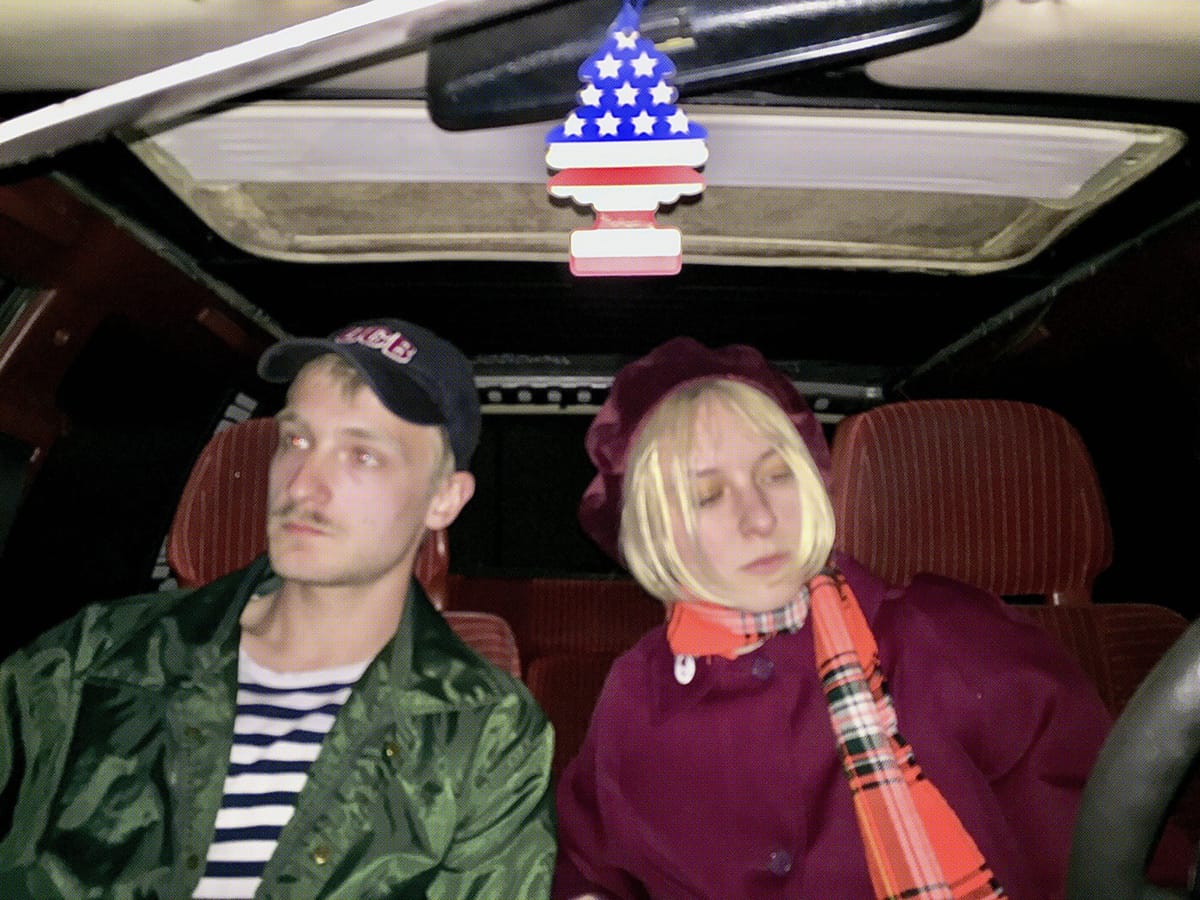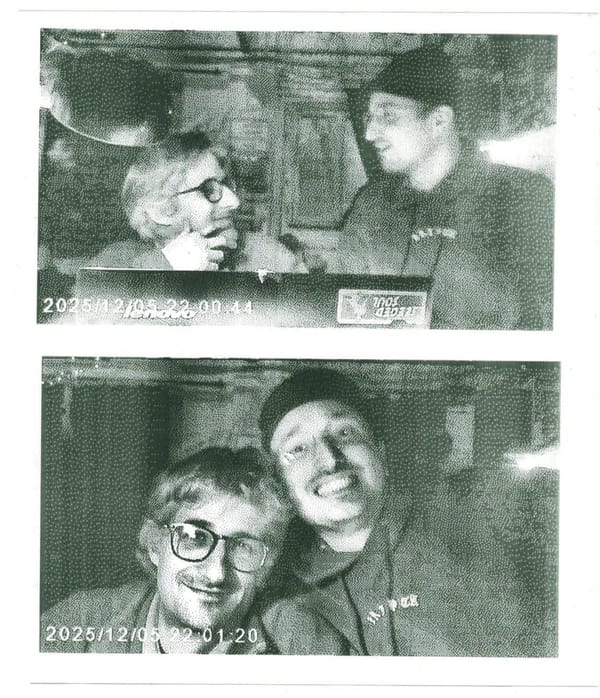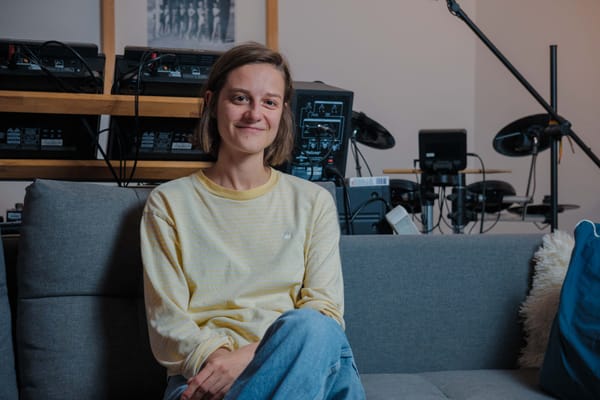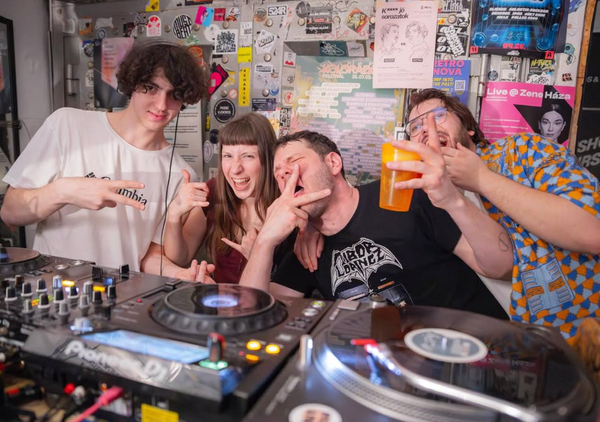Register for free to receive our newsletter, and upgrade if you want to support our work.
Behind the abbreviation SSRI stands the Łódź based experimental duo of Sandra Mikołajczyk and Igor Gadomski. Their tracks (currently signed to the roster of the Polish experimental cassette label Pointless Geometry founded by former Warsaw DIY producers FOQL alias Justyna Banaszczyk, and Copy Corpo alias Darek Pietraszewski) have been featured on NTS and The Wire shows and mixtapes. SSRI’s concept behind their radio programme at the Polish community radio Radio Kapitał coalesced in the eponymous debut album that revolves around the idea of the imagined vision of the tropics transposed by dub, post-industrial sounds, ambient, tropical beats, and drone music. The album got recognition in international media like The Quietus or The Guardian. In Sandra’s words: „SSRI encapsulates the imaginary vision of tropical places from the perspective of a person coming from a gloomy, grey Polish city”. At the brink of the emerging summer tropical heatwave, we spoke online about urban illness, the collaboration with Pointless Geometry, the preparation of the album, and Łódź’s thriving musical scene.
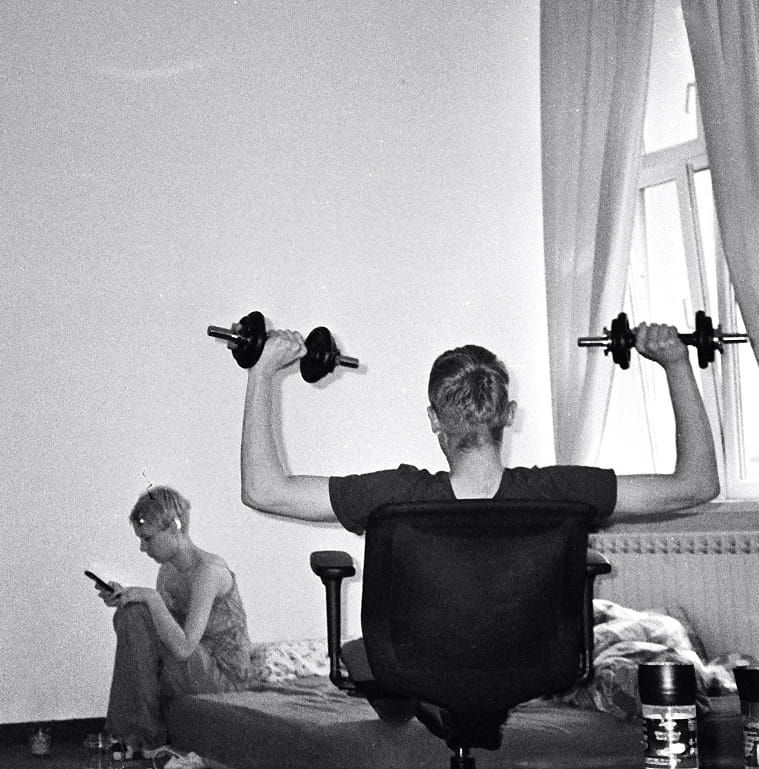
The first thing that I came across when I was searching for the origin of your name SSRI was a Wikipedia entry describing a class of antidepressants called selective serotonin reuptake inhibitors. Then I found out that it is indeed associated with your project. Where did the idea of this name come from in the first place?
Sandra: I don't remember how it happened. It was probably the moment when I stopped taking those antidepressants. It is a group of meds with which you usually start drug therapy. I'm not sure how they work, but I know they inhibit the excretion of serotonin from the body. But maybe not on me. When I stopped taking them, my creativity and urge to create returned. I thought a lot at the time about how I, and perhaps many others with mental health issues, end up taking medications to meet society's demands and stop thinking about making art or music, which is destined for commercial failure.
Igor: The name stuck after one of our gigs, where we played under this moniker. Also, our radio programme at Radio Kapitał is called SSRI. I generally think it's a bit edgy. It’s reminiscent of the 2014 era, and Tumblr, where people talked a lot about depression and anger.
I was also digging through the archive of your radio programme at Radio Kapitał and found that you delve into the topic of mental health a lot. In the descriptions, you often mention free therapies, narcolepsy, or obsessive-compulsive disorder. In your press release, you talked about the “distorted concept of tropical nature”. I was wondering if you connect mental health with the structural state of the public space, as I found that your recordings emanating dub density and convulsions would be transferable to the inner state, but also the experience of anxiety and suffocation in urban landscape.
Sandra: The answer is yes. With the idea of the distorted concept of tropical nature, I had something complicated on my mind that I could not easily explain. It is a result of many factors. We needed music, which would be pleasant, but you can't do this sort of music in the Łódź climate.
What things inhibit you from making pleasant music in Łódź climate?
Sandra: It reminds me of a situation from the past. With my friend, we listened to some new recordings for the first time. We instantly fell in love with the music and agreed it was the best thing we had ever heard. After we headed home, I played the release again in my earphones. I found that the experience with the music was different. Our jack broke, and we were only hearing the bass. I associate this situation with the moment when tropical music comes to Łódź but in a distorted manner. The inspiration of a city and the distorted nature is an outcome of many elements. For example, I was in a warm country for the first time a year ago. As a child, I never travelled abroad. We didn't have money, and the tropics appeared to me as something non-existent, like a film or literary fiction for kids. I could never imagine I would go to a place like this. The music connected to this area was surreal as well, as if it never existed. I think that SSRI encapsulates this imaginary vision of tropical places from the perspective of a person coming from a gloomy, grey Polish city.
Igor: We predominantly draw from Jamaican and Caribbean music but also from the far, isolated islands of Oceania. The ways some of the genres there emerge are fascinating.
Sandra: You could say it is a tropical landscape played from broken speakers. Around the release of the record, I found out that there is a genre that describes it precisely: illbient. It turns out that it also has its history with the imagination of the tropics and the grey urban malady.
When I was listening to your album, I had the same feeling, but almost with dystopian associations. You use a lot of reverb, veiled vocals, and slow drums. The first half gradually builds tension, it's like walking through a concrete city on a super hot day feeling that something will erupt at any minute. The second part is more ambient, drone, a release of this tension. Was the structure of the recording narrative-driven or how did you conceptualize the ordering of your release?
Sandra: The order of tracks is the way I wanted them to be from the start. They indeed constructed a narrative. It was important to me that the album actually starts in the depths of a jungle and gradually comes up to the surface and the city. They were supposed to be more light and sunnier. There is also another version of the album, which is more random, and not holding a compact story. I stood up for this track order, seeing the album as an opera where each track has its place and function. I’m really happy that we ended up with the emerging from the darkness variation. We spent a lot of time talking about the concept with our label, Pointless Geometry. They waited for a long time, because we did everything at the last moment. Everything seemed unfinished to us all the time. We still thought we might do more. We value the collaboration with Adam Badí Donoval (from the Slovak experimental label Warm Winters Ltd.), who mastered and mixed our debut. He helped us concise the narration, and the joint work was one of the most pleasant encounters we’ve had. I’m a chaotic person who struggles with putting certain things into words. And I sent him tons of emails with the descriptions of the colours of the music and my musings on the idea. He understood everything and interpreted it the way I had imagined.
You received plenty of great reviews on your debut. Some of the appraisals appeared in The Quietus and The Guardian. You were also listed in the newsletter Futurism Restated by the Pitchfork writer Philipe Sherburne. I think it's well deserved. On the other hand, I was thinking about how the success of especially experimental music is dependent on the presence in Western media. There is a great saturation of releases powered by regional labels like mappa, Mondoj, Adam's Warm Winters, or Pointless Geometry, but not many of them receive proper recognition. What do you take from this sudden attention?
Igor: I think the biggest credit belongs to Pointless Geometry – to Darek Pietraszewski and Justyna Banaszczyk, who run the label. They’ve been doing it for years, and they would do anything for experimental music. They fight a lot for the popularisation of the music. I think that without them we wouldn't be so visible in the media.
I also saw that Justyna, who goes under the artist name FOQL, listed you in her mix that appeared in The Wire, but that was like two years ago – how long were you preparing the album for?
Sandra: A few of the tracks appeared in some guises occasionally over the years. Many people thought that we couldn't release the album. We never published it anywhere, there was maybe one gig on YouTube. Sometimes somebody would play a track on a radio show, etc.
How did you end up with Pointless Geometry in the first place?
Igor: I think we can't say we ended up with them, we know each other privately.
Sandra: They supported me right from the beginning. Then I met Igor, so they took care of both of us. I played my first gig without any basic music-making abilities, because Justyna just believed in my capacity to do it. I don't know why. Then she was a fan of everything that we did. She endorsed every initiative. We’ve known each other for ten years.
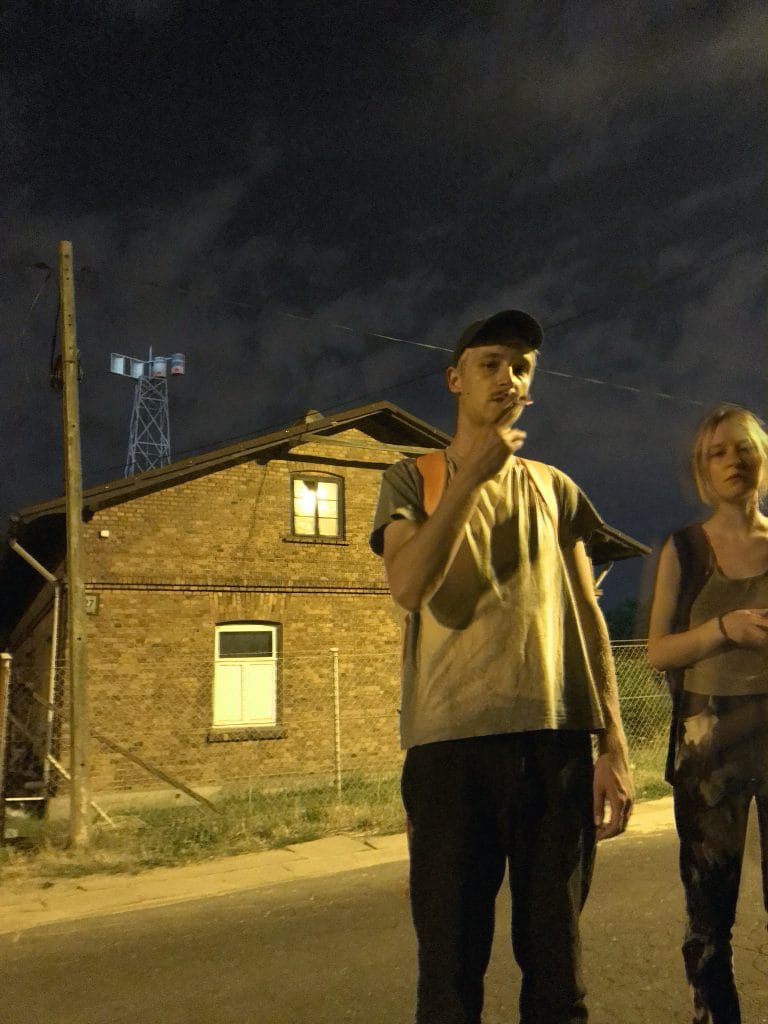
Did you meet in Łódź?
Igor: I did, but with Sandra, it goes way back to Warsaw.
Sandra: Yes. Justyna and Darek had been living in Warsaw and started Pointless Geometry there, coming up from the Eufemia venue. We soon became friends, went to festivals together, attended gigs, and so on.
Were you musically active before SSRI or do you draw from any specific musical background?
Igor: Not really. I played with FL Studio a bit.
Sandra: Don't you want to talk about your vaporwave album?
Igor: It's long ago and not true. I think you can't get it anywhere anymore.
Sandra: I think I have one in my flat, I can give it away for 1000 złotys! Before I met Igor I’d always dreamt about music-making, bud I had no education. I was driven by intrusive neurosis so I sat on some sound for so long until it sounded well in my opinion. Then I met Igor, and he had all these skills already, so you could tell him the concept of the sound, and he just knew how to play it.
How did you get to the point of putting SSRI together?
Igor: I'd say it's just the love for music and the fascination with it. If Sandra wasn’t there, I’d probably still be making something for the drawer. The sounds would never see sunlight.
Sandra: Igor is talented. It would have been the greatest failure in my life if I let his music be obscured and hidden.
How do you function in tandem? Do you separate your work somehow?
Sandra: Our modus operandi is working under time pressure. Otherwise, we dissolve in the plethora of possible choices.
Igor: I would say we collect sketches. If some bigger and more concise concept should appear, then we have to have some internal drive.
Sandra: When we have a knife at our throat then we finish it. We are not lazy or running away from work, but it's a matter of a certain mental barrier. I have this trait of quickly becoming demotivated if something doesn't sound the way I imagined, and then I throw it away. I work way better on Igor's projects, where I focus on putting them into the frame of a beginning and and end. Igor's drafts have a lot of elements and I don't know how they are made, so they give you the satisfaction just from listening. As I said before, in my case, it is sitting a week on a sound, and after that time I’m sick of it. It takes me a while because I do everything randomly. I much more enjoy adding my 3 pennies to the work.
Is it also a matter of perfectionism?
Sandra: Sometimes yes, especially from someone who doesn't have a musical background. I often don't have the energy to finish something until Igor comes, doublechecks, and finds the solution. But Igor also often doesn't come, because he is too lazy. I have some visions in my head and the realization takes a lot of time and enthusiasm, which I don't have. I live with depression, and with it, you can create very little. The episodes, from which more music emerged including the finishing up after Igor, coalesced with medication therapy. If you are out of it, you are naturally struggling with lower self-worth. Under these circumstances, it is hard to promote an album and not feel ashamed, I mean spamming with your content. I was used to a routine when you would post a few things a year. After you release an album, you now have to upload something every day. It overwhelmed us. We are indeed really happy that the album got published with such a great cover, and sound, and everything is the way I had dreamt of. It is already a great success, and any other success beyond it including reviews makes me stop believing it is real.
I would like to make a quick jump back to Łódź because Pointless Geometry is highly invested in the local experimental scene and you also draw from the city on your debut. How did the industrial aspect of the city, and its changes due to gentrification influence you?
Sandra: I still live close to Łódź and even today I realized that my attraction to the city came from the vibe of its inaccessibility. I only came to the city when there were occasions to do so, like the opening of a new shopping mall. I was longing for the social vibrancy, the light, the concrete, and the things I didn’t have in everyday life.
Igor: Everything in Łódź still happens very slowly. I don’t see big changes, I would rather say it stagnates. Since the industrial character of the city dissolved, no one came up with the right solution of what to do with the location. But in the so-called musical scene that I’m a part of, many people start new projects, or bands, or just decide to play. In this sense, I think the city flourishes. If we’re talking about politics and government, then it’s a nightmare.
Sandra: It’s true. There are some instances of “ego projects” like 600 Years of Łódź, where the city is more open to funding the concerts of foreign bands like Franz Ferdinand than supporting the local scene with grants on everyday basis. I can’t imagine how the independent musical scene would survive there if it wasn’t for Justyna and Darek.
Igor: There are also new venues, where you can perform your debut despite your age. For a long time the older, more solidified Łódź scene played the role of a gatekeeper, so there weren’t many opportunities to play as an unknown, emerging artist.
Sandra: As a small, sweet kid, I had an easier way to get through the gates of this scene. I had the opportunity to play in a club called DOM. But maybe not many people had this luck. Regarding Łódź, I heard this one quote, that the people in Łódź make music because they don’t have anything to lose. I think it’s true. We don’t.
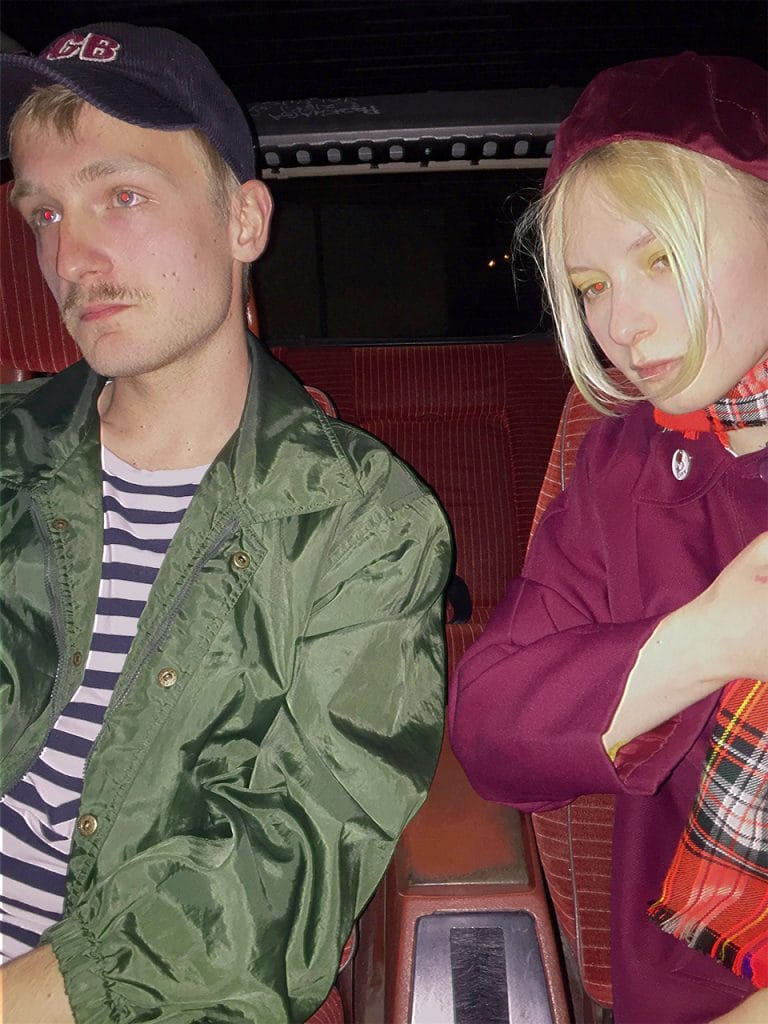
This article is brought to you by Easterndaze as part of the EM GUIDE project – an initiative dedicated to empowering independent music magazines and strengthen the underground music scene in Europe. Read more about the project at emgui.de.
Funded by the European Union. Views and opinions expressed are, however, those of the author(s) only and do not necessarily reflect those of the European Union (EU) or the European Education and Culture Executive Agency (EACEA). Neither the EU nor EACEA can be held responsible for them.


